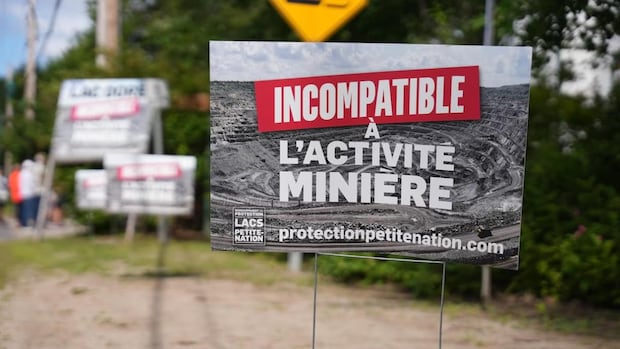People living in five municipalities in western Quebec have overwhelmingly voted against a proposed graphite mine in the area in a referendum held Sunday.
B.C.-based Lomiko Metals wanted to mine graphite around Lac Bélanger just west of Duhamel, Que., about 80 kilometres northeast of Gatineau.
The area has a combined population of nearly 6,000.
The municipalities of Duhamel and Lac-Simon showed the strongest opposition this weekend, with 98 per cent of voters casting ballots against the project.
In the municipalities of Lac-des-Plages, St-Émile-de-Suffolk, and Chénéville, more than 90 per cent of voters also said no to the mine.
In all, 2,754 votes were cast against the mine, with just 115 people voting in favour.
Duhamel Mayor David Pharand, who has opposed the project for years, said he was impressed by the results.
“I can assure the population that the percentage of the results of this referendum will have a major impact on the decision of the government and the action that will be taken,” Pharand told CBC.
“We will work based on those numbers with our political, federal, and provincial members of parliament to see that this project is not funded.”
Local opposition isn’t new
The referendum followed three public meetings held since 2024 in which nearly 1,000 citizens participated, according to information from an alliance representing the five municipalities.
In July, Lomiko Metals announced it had received a permit to begin more advanced exploration work on the La Loutre Mine from Quebec’s Ministry of Natural Resources.
A presentation to the company’s investors said that a pre-feasibility study would be done in early 2026.
Duhamel, Que., Mayor David Pharand, the spokesperson for an alliance opposing the Lomiko Metals Inc. graphite mine, speaks to a Radio-Canada reporter on July 21, 2024. (Jean-Sébastien Marier/Radio-Canada)
Before Quebec’s last provincial election in 2022, Premier François Legault indicated that his CAQ government would not carry out the mining project without what’s referred to in the province as “social acceptability.”
Then last September, the province announced it would not fund the mine because it did not meet their standards for local support.
Lomiko Metals had not responded to the results of Sunday’s referendum at the time of publication.
But in a statement last year, the company said it was surprised and disappointed provincial funding would not go ahead, saying the Legault government appeared to be making “pre-emptive conclusions about the project” before the necessary studies had been completed.
Other opposition groups had also voiced concerns about potential military applications of the mine, especially after Lomiko Metals secured funding from the Pentagon.
Results will be respected, says MNA
The area’s municipal and provincial representatives have both said they’ll respect the results of the referendum.
In a French news release, Paul-André David, the prefect of the Papineau MRC, said the opposition speaks to the environmental concerns residents have with the mine.
“The MRC will have to take the necessary measures to protect the interests of the community, by demanding that governments ensure that the sustainable management of water, air and landscapes is at the heart of discussions,” the release said.
Prior to polls closing, Mathieu Lacombe, the CAQ’s MNA for Papineau, said in French that “citizens can be assured that I will always side with them.”
“If it is against the mine, it will confirm what I have felt on the ground for several years. If it is in favour of the mine, we will have to talk again among elected officials in Papineau to see how we handle the future,” he said in a statement.
Lacombe later called the results “unequivocal” in a French-language Facebook post and said he’d keep working to “ensure that the will of citizens is respected.”
Kitigan Zibi Anishinābeg wants more information
If it were built, the La Loutre project would be located on Kitigan Zibi Anishinābeg’s territory.
The community — which decided not to take part in Sunday’s referendum — says the mining company has approached them for years but hasn’t yet provided the answers they’re looking for.
“We’ve asked them about mitigation, reforestation, protection of the water, and they haven’t been able to answer that because they are in the exploration stage,” said Chief Jean-Guy Whiteduck.
Whiteduck said without a clear understanding of how Lomiko would mitigate the project’s impacts, a referendum in his community would probably yield similar results.

